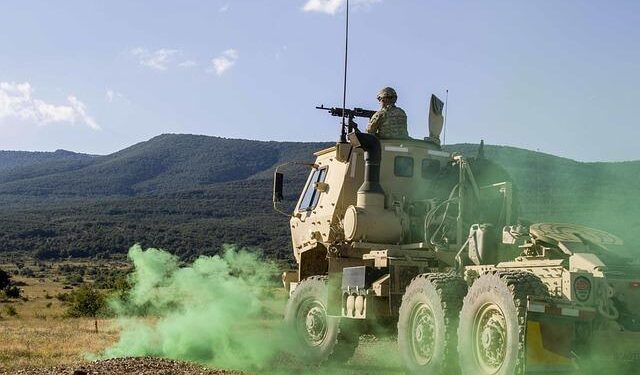The North Atlantic Treaty Organization (NATO) has played a pivotal role in shaping the security landscape of the Balkans, particularly in Kosovo. Since the late 1990s, NATO’s involvement in the region has been instrumental in stabilizing a territory long marred by ethnic conflict and political uncertainty. As outlined on NATO’s official homepage, the alliance’s peacekeeping efforts and ongoing missions in Kosovo underscore its commitment to maintaining peace, supporting institution-building, and fostering regional cooperation. This article explores NATO’s evolving role in Kosovo, highlighting the challenges faced and the achievements made in promoting lasting stability in this strategically significant area of Southeast Europe.
NATO’s Strategic Influence on Post-Conflict Stabilization in Kosovo
Since its intervention in 1999, NATO has played a pivotal role in transforming Kosovo from a conflict-ridden territory into a relatively stable region. The alliance’s presence has been crucial in ensuring security, facilitating the return of displaced persons, and supporting the establishment of democratic institutions. Through its Kosovo Force (KFOR), NATO has maintained a robust peacekeeping presence that deters hostility and fosters an environment conducive to rebuilding civil society. The organization’s multifaceted approach combines military vigilance with diplomatic engagement to address lingering ethnic tensions and promote reconciliation.
The impact of NATO’s mission can be summarized through key strategic priorities:
- Security Maintenance: Preventing the re-emergence of violence and securing borders.
- Institutional Support: Assisting local governance and rule of law enforcement.
- Humanitarian Assistance: Enabling safe returns and supporting displaced communities.
A concise overview of NATO’s operational metrics in Kosovo during the past decade illustrates the scale and continuity of its efforts:
| Operation | Personnel Deployed | Key Achievements |
|---|---|---|
| KFOR | Approximately 3,500 troops | Maintained ceasefire, border control, and community protection |
| Training Missions | Over 1,000 local forces trained | Strengthened Kosovo Security Force capabilities |
| Human Rights Monitoring | Implemented regular patrols in sensitive areas | Enhanced protection of minority rights |
Challenges and Achievements of NATO’s Peacekeeping Operations
NATO’s peacekeeping mission in Kosovo has navigated numerous difficulties since its inception, marked by complex geopolitical tensions and volatile ground realities. Among the primary challenges were ongoing ethnic conflicts, ensuring the protection of vulnerable civilian populations, and maintaining impartiality amid local factions. Furthermore, logistical constraints and coordination between multiple international actors often tested NATO’s operational agility, demanding constant adaptation and resilience from peacekeeping forces.
Despite these hurdles, NATO has secured notable achievements that underscore its critical role in stabilizing the region. The establishment of the Kosovo Force (KFOR) created a security environment conducive to political dialogue and economic rebuilding. Noteworthy accomplishments include:
- Reduction of violent incidents by over 70% within the first five years.
- Facilitation of refugee returns to their homes by guaranteeing safe access routes.
- Support for local institutions to foster democratic governance and rule of law.
These successes have not only contributed to regional stability but also strengthened NATO’s reputation as a pivotal peacekeeping force in post-conflict zones.
| Year | Key Challenge | Major Achievement | |||||||||||||||
|---|---|---|---|---|---|---|---|---|---|---|---|---|---|---|---|---|---|
| 1999 | Rapid deployment amid crisis | Swift establishment of safe zones | |||||||||||||||
| 2004 | Ethnic violence resurgence | Recommendations for Enhancing NATO’s Role in Kosovo’s Long-Term Security To solidify its influence and effectiveness in Kosovo’s long-term security landscape, NATO should prioritize deepening its cooperation with local institutions and civil society organizations. This approach will ensure that security measures are not only externally supported but also locally owned, fostering trust and resilience within Kosovo’s population. Additionally, enhancing the integration of advanced surveillance and intelligence-sharing technologies can empower NATO forces to anticipate and neutralize emerging threats more efficiently, strengthening overall stability in the region. Furthermore, increasing investment in joint training programs with Kosovo Security Force personnel will boost interoperability and preparedness for future challenges. Equally important is fostering community-based dialogue platforms, which can help address persistent ethnic tensions and prevent potential escalations. Below is a quick overview of key strategic focus areas for NATO’s enhanced contribution:
The ConclusionIn conclusion, NATO’s role in Kosovo remains a pivotal element in maintaining stability and security in the Balkans. From its initial intervention in the late 1990s to its ongoing peacekeeping and support missions today, the alliance continues to adapt its presence to meet evolving challenges. As regional dynamics shift, NATO’s commitment to fostering peace and cooperation in Kosovo underscores its broader mission of promoting international security. For the latest updates and in-depth information on NATO’s activities in Kosovo, visit the official NATO homepage. ADVERTISEMENT |
















